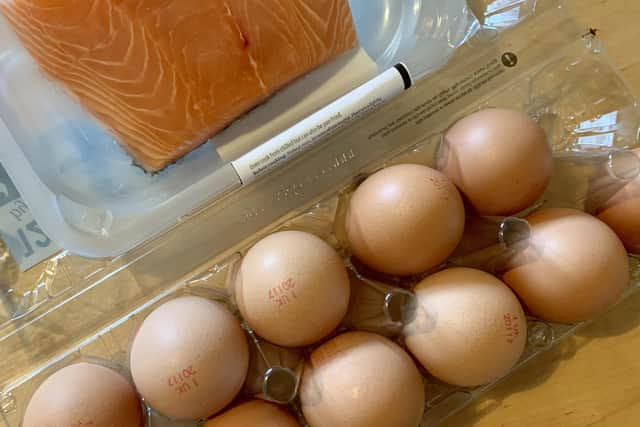Rushden dietitian talks about importance of vitamin D this winter
This article contains affiliate links. We may earn a small commission on items purchased through this article, but that does not affect our editorial judgement.
and live on Freeview channel 276
An expert on diet and nutrition has shared her knowledge on vitamin D as we head into the winter months.
Dr Mabel Blades of Rushden is a freelance registered dietitian and nutritionist, who is also public governor for East Northamptonshire KGH Hospital Trust.
Advertisement
Hide AdAdvertisement
Hide AdDr Blades shared her knowledge with the Northants Telegraph during the pandemic, helping us to follow a balanced diet and look after ourselves while the country was in lockdown.


She is back once again with advice on diet and nutrition as we head into the winter months.
This week she is talking about vitamin D and bone health.
Dr Blades told the Northants Telegraph: “Vitamin D is required to enable the body to absorb enough calcium to keep bones strong.
"During the summer months April to the end of September we can make enough vitamin D for our needs.
Advertisement
Hide AdAdvertisement
Hide Ad"As vitamin D is a fat-soluble vitamin it can be stored by the body.
"Some individuals do not go outside or expose their skin to sunlight.
"This can be due to reasons such as working long shifts, being too unwell to go out or wearing clothes that cover the skin.
"If bones become weakened due to containing too little calcium such as occurs in osteoporosis/osteomalacia, then people can fracture a bone which requires orthopaedic expertise.
Advertisement
Hide AdAdvertisement
Hide Ad"Fractures like a broken hip require surgery and a stay in hospital plus help from a physiotherapist.
"There was a good members’ event from Kettering General Hospital Trust on preventing hip fractures last year.
"The orthopaedic expert speaking at the event explained how depleted in vitamin D many of the sufferers of hip fractures were.”
Good food sources of vitamin D include:
- oily fish such as salmon, sardines, herring, and mackerel: There are various canned sources of these fish which are easy to keep in the store cupboard and make the basis of a quick and easy meal such as sardines on toast, salmon or mackerel fish cakes made with mashed potatoes and added
herbs
Advertisement
Hide AdAdvertisement
Hide Ad- red meat and liver: Many people do not consider liver, but it can be used to make pates and also traditional dishes like liver and onions and if cut into
strips is good in stir fries (It should be noted pregnant women are advised not to eat liver as it is high in vitamin A)
- egg yolks can be added as extras to items like cakes and puddings
- fortified foods such as some fat spreads and breakfast cereals
Advertisement
Hide AdAdvertisement
Hide AdFor those following a vegan diet most plant-based milks are supplemented with vitamin D and calcium – check the label.
Mushrooms contain vitamin D, which can be increased by putting them into sunlight.
Vitamin D supplements of 10 micrograms per day are suggested each day especially in the winter.
Supplements can be bought as tablets and oils as well as sprays used under the tongue.
Advertisement
Hide AdAdvertisement
Hide AdThe British Dietetic Association has a factsheet about vitamin D: https://www.bda.uk.com/uploads/assets/01d7715f-c4f7-42e7-96f67018f035b0ea/Vitamin-
Recordings of members’ events on health topics can be obtained from Kettering General Hospital here: https://www.kgh.nhs.uk/membership-events/
For specific advice on your diet, Dr Blades advises that you consult your dietitian, doctor, or health professional.
Follow Dr Blades on Twitter via @blades_mabel